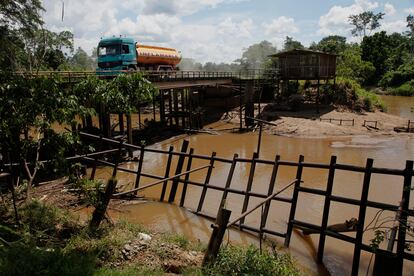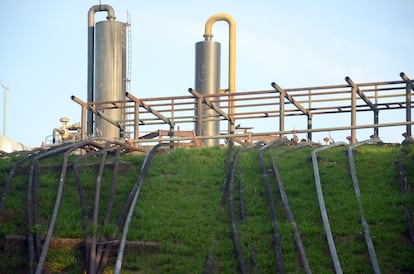President Noboa: Drowning the Amazon in oil will not make Ecuador safer
The country voted to end the exploitation of the Yasuní national park, but four months before the deadline, the government has not taken a step to end the extractions

When I was 12 years old, I remember seeing the crude oil flowing down the river like jelly for the first time in the Waorani lands, in the heart of the Ecuadorian Amazon. When the river overflowed, that crude would then spread across our land, contaminating and staining everything, from our houses to our lush green forests.
When the oil industry arrived at the Yasuní, they promised to bring development and a better life for the Indigenous peoples that have called it home for millennia. Instead, we only inherited death, destruction, and diseases we never had before, like cancer.
Our vibrant forest, where once we heard only the sounds of our people and the vast biodiversity, is now silenced by the sound of chainsaws and bulldozers, and our environment is contaminated. We can no longer sow in the place we have always sowed because the yucca and banana plants no longer bear fruit — instead of growing, they die.
Last year, my country chose life over all this death — a majority of Ecuadorians chose to end drilling in the Yasuní in a binding referendum. It was an inspiring vote of faith in the future of Ecuador that we could build together as citizens. A future that respects the Earth and our communities.
President Noboa seemed to want this future too — he voted yes in the referendum and made it clear that Ecuador would need to look beyond oil to achieve sustainable prosperity. Eight months later, it is clear that my people are not a part of Noboa’s #NuevoEcuador.
According to the will of millions of Ecuadorians, the Yasuní oil operations should shut down completely by this August. This is a historic decision at the national level that forces the Noboa government to define urgent actions to act in a post-extractive process and generate sustainable options that sustain the ways of life in this megadiverse territory. But now, four months from that deadline, not a single step towards the end of drilling has been taken. Rather, President Noboa has been signaling that our vote might not be respected.

Ecuador is troubled with violence and a deepening economic crisis that this government hopes to address using fossil fuel revenue. However, weakening our democracy and destroying our greatest natural asset, the Amazon, is not the solution. These choices cannot be undone and they will continue to devastate Ecuador. No economic recovery is possible without the Amazon.
President Noboa has been traveling the world looking for financial support to take our country out of this violent turmoil. But we can’t build a new Ecuador while relying on the same outdated oil economy of destruction. Are financial institutions such as the IMF and the World Bank willing to pour more money into unsustainable development and invest in a plan that weakens democracy to benefit the oil industry?
The same crude that contaminates our rivers and leaves our children thirsty for clean water flows straight to the global North to quell the thirst for more oil in places like California, filling the pockets of fossil fuel companies that are driving our planet to a precipice.
April was a decisive month for us in Ecuador. On April 21, citizens voted on a new referendum on measures to fight organized crime and reform the Ecuadorian Constitution. But how can we hope that our vote will be respected if the Yasuní referendum results have been kicked to the corner?
The world can’t trust an Ecuador that does not abide by its democratic processes. We are worried about giving more powers to a president who has shown he does not respect the word of the people on the Yasuní. We have seen how easily fighting crime has turned to authoritarianism elsewhere, such as in El Salvador. Is Noboa a new leader or just an Instagram version of the same old politics?
People often say that the Amazon is the lungs of the world. But for us, Waorani, she is a whole person: it has rivers that are connected and flow like blood, trees that spread like limbs and it pulses life towards the entire world like a heartbeat. The Yasuní is a sacred person to us, and the oil industry is hurting her very existence. The oil that today spills in our lands is also spilling destruction beyond our borders, and what happens here matters everywhere.
We, the Indigenous peoples, are the guardians of this planet, and our fight to keep the Yasuní and the Amazon standing is a fight for a livable world for all. We, the Waorani, are known for the strength of our women: we are mothers, leaders, and warriors. Since my younger days I have learned to fight for the survival of my people and of our home. And I now call on the world to join this fight toward an Amazon free of fossil fuels.
Recently, our brothers and sisters in Colombia took important steps committing to the non-proliferation of fossil fuels. Now, Ecuador has an incredible opportunity to also lead this movement, and to inspire other countries to follow its leadership. Will President Noboa have the courage to build a truly New Ecuador, one that respects its people and biodiversity?
Sign up for our weekly newsletter to get more English-language news coverage from EL PAÍS USA Edition
Tu suscripción se está usando en otro dispositivo
¿Quieres añadir otro usuario a tu suscripción?
Si continúas leyendo en este dispositivo, no se podrá leer en el otro.
FlechaTu suscripción se está usando en otro dispositivo y solo puedes acceder a EL PAÍS desde un dispositivo a la vez.
Si quieres compartir tu cuenta, cambia tu suscripción a la modalidad Premium, así podrás añadir otro usuario. Cada uno accederá con su propia cuenta de email, lo que os permitirá personalizar vuestra experiencia en EL PAÍS.
¿Tienes una suscripción de empresa? Accede aquí para contratar más cuentas.
En el caso de no saber quién está usando tu cuenta, te recomendamos cambiar tu contraseña aquí.
Si decides continuar compartiendo tu cuenta, este mensaje se mostrará en tu dispositivo y en el de la otra persona que está usando tu cuenta de forma indefinida, afectando a tu experiencia de lectura. Puedes consultar aquí los términos y condiciones de la suscripción digital.








































